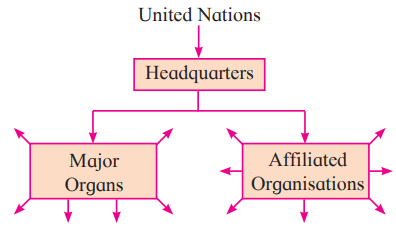Question Answers For All Chapters – Political Science Class 9
Exercise
1. Choose the correct option:
- This country is not a permanent member of the United Nations Security Council – (c) Germany
- This international organization conducts workshops in India on remedial measures to tackle the problem of malnutrition among children – (a) UNICEF
- The number of members of the United Nations – (b) 193
2. State whether the following statements are true or false. Give reasons for your answer.
(1) The United Nations General Assembly is a platform to discuss global problems.
- Answer: True
- Reason: It meets yearly to discuss issues like peace and environment for all nations.
(2) The status of all the member nations of the United Nations is not equal.
- Answer: False
- Reason: The UN treats all member nations equally, regardless of size or power.
(3) A resolution can be passed even if China exercises its veto power.
- Answer: False
- Reason: China’s veto as a permanent member stops any Security Council resolution.
(4) India has played a major role in the work of the United Nations.
- Answer: True
- Reason: India has contributed to peacekeeping, raised racism issues, and supported development.
3. Explain the following concepts:
1. Veto: The veto is a power given to the five permanent members of the UN Security Council. If any of them use their veto, a decision cannot be passed. It helps them protect their national interests.
2. UNICEF: UNICEF is a United Nations organization that works for the welfare of children. It provides healthcare, education, and nutrition support. It also helps in emergencies like wars and natural disasters.
4. Answer in brief :
1. Reasons for the establishment of the United Nations:
- The UN was created in 1945 after World War II to maintain global peace. It aims to prevent wars, protect human rights, and promote cooperation. It also works to solve global problems like poverty and health issues.
2. Role of the Peacekeeping Forces of the United Nations:
- UN Peacekeeping Forces help maintain peace in war-affected areas. They protect civilians, monitor ceasefires, and provide humanitarian aid. Their goal is to restore stability and security in conflict zones.
3. Objectives of the United Nations:
- The UN aims to maintain peace, protect human rights, and support development. It also provides humanitarian aid and promotes international cooperation. The organization works to solve global issues peacefully.
5. Complete the following activity as per the given instructions.
(1) Complete the following chart giving information about the organs of the United Nations.
| No. | Organ | Number of Members | Functions |
|---|---|---|---|
| 1. | United Nations General Assembly | 193 | Discusses global issues, makes policies, and elects officials. |
| 2. | United Nations Security Council | 15 | Maintains international peace and security, and makes important decisions. |
| 3. | International Court of Justice | 15 | Settles disputes between countries and gives legal advice to the UN. |
| 4. | Economic and Social Council | 54 | Works on economic, social, health, and human rights issues. |
(2) Show the chronology of the establishment of the United Nations
- 1941 – The Atlantic Charter was signed by the USA and the UK, stating principles for world peace.
- 1944 – The Dumbarton Oaks Conference was held to discuss the formation of the United Nations.
- 1945 – The United Nations was officially established on 24th October 1945 after the signing of the UN Charter.
(3) Completed Tree Diagram of the United Nations
United Nations
⬇
Headquarters: New York, USA
⬇
🔹 Major Organs: – General Assembly – Security Council – International Court of Justice – Economic and Social Council – Secretariat – Trusteeship Council
🔹 Affiliated Organisations: – UNICEF (United Nations Children’s Fund) – WHO (World Health Organization) – UNESCO (United Nations Educational, Scientific and Cultural Organization) – IMF (International Monetary Fund) – World Bank


Leave a Reply